Physical activity and development are critical for young children’s development. They are like a ripple effect, there are so many intertwining sectors of learning that support this area and visa versa.
These sectors are:
- A healthy diet and nutrition
- Fine motor skills, such as pencil control supporting language development
- Creatively expressing yourself whether through art or movement
- Problem solving, making connections and risk assessment
- Emotional confidence and well being
- The world around us and science
We’ve all tried to pick up a child off the floor to get them to stand or put them in their car seat only to be amazed at their ability to go a dead weight, as rigid as a plank of wood, or suddenly develop the ability to no longer weight bare! The reality is our bodies are an exceptional vessel and go through many stages of transformation when it comes to physical growth and development. Some changes are visual, from sitting to crawling, walking to peddling, and others involve brain development, setting the groundwork and foundations for developments to emerge later on.
Childcare settings have an important role in promoting children’s gross-and fine-motor skills and children learn best when they are actively engaged in their environments. It is essential that they are provided with ample opportunities to explore their environments by touching, moving, experimenting, and manipulating different objects, toys, and materials. Learning occurs best when children use their bodies to explore their surroundings, practise new skills, and are actively engaged in meaningful environments.
To encourage physical development you should ensure you are:
- Giving all children access to opportunities that promote physical development.
- Responsive to children’s individual differences.
- Establishing appropriate expectations about what children should be able to do in terms of physical development and growth.

Over the years I think we have all come to realise the importance of physical activity in relation to our own mental health. Even more so with the restrictions and regulations that have been in place for the past 12 months or so! They have allowed us to hold a mirror up to how we view children’s emotional wellness, something we maybe forgive to thinking only really starts in adolescence with hormones, educational challenges and peer pressure!
The World Health Organisation defines health as “a state of complete physical, mental, and social well-being and not merely the absence of disease or infirmity.” By encouraging children to be physically active, and as role models yourselves becoming more aware of how this development supports the mind and soul, you are enabling preschoolers to explore and develop these elements. This can set the groundwork for a generation of emotionally aware, balanced and confident individuals, who’s early experiences with physical development opened up pathways to long term health and well-being continuing into adolescence and adulthood.

